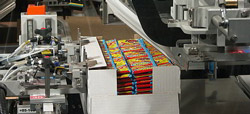
Posted to News on 21st Dec 2017, 10:28
Top-three requirements for machine control systems
David Randall, Business Development Manager at Lenze UK, offers three key requirements for modern industrial control systems as seen from the viewpoint of machine builders and OEMs.

There are many different and sometimes conflicting requirements for modern industrial control systems, but if you are a machine builder or OEM, what are three three that are most important for you?
1 - Fast, flexible programming
In the pursuit of competitive advantage, owners want more capable, flexible and highly customised equipment. That puts ever greater pressure on machine builders and system integrators, requiring the rapid, reliable development of complex, bespoke control applications.
The advent of pre-developed and tested function blocks, like Lenze's FAST blocks, eliminates much of the heavy-lifting in control software development, reducing programming time by up 70 per cent. That enables machine builders to spend more time on the machine features that really make a difference for their customers. FAST blocks can handle a wide range of motion tasks, from winding applications in packaging machinery to complete robot control. And this modularisation of control programming also permits the transfer and reuse of code across industries and applications. Our Smart Conveyor FAST block, for example, was originally developed for product spacing in CPG (consumer packaged goods) packing lines, but it is also used in warehouse operations and even airport baggage handling systems.
2 - Seamless connectivity
In the modern production environment, data is king. Smart data analysis techniques are delivering significant improvements in the areas that matter most to equipment owners, like quality, reliability, productivity and efficiency. For control systems, this means the ability to record detailed information on equipment performance, and to share that data via fieldbus connections, are now basic requirements. For machine builders, however, the big opportunity comes not from the generation of data for its own sake, but from the ability to transform data into added value for the customer. That can be achieved in a number of ways, from the remote monitoring and troubleshooting capabilities, to development of automated intelligent predictive maintenance solutions.
3 - Simulation and augmented reality
Machine builders and their customers both want solutions that work right first time. Rising complexity and tight development timescales are relentlessly squeezing the time and money available to build prototypes or fix issues that emerge during testing and commissioning.
Virtual prototyping of individual machines and even complete factories is a powerful way to evaluate new concepts and identify issues or improvement opportunities. The advent of virtual and augmented reality technologies means operators can participate in the simulation too, allowing the ergonomics and human interface details to be evaluated earlier and more effectively. Motion and control equipment makers are embracing this trend, supporting their hardware offerings with appropriate digital models and simulation tools.
Follow the link to find out more about machine control systems from Lenze.
Want the latest machine building news straight to your inbox? Become a MachineBuilding member for free today >>

















